- Home
- Alton Gansky
Finder's Fee
Finder's Fee Read online
altonGANSKY
FINDER’S
FEE
ZONDERVAN
Finder’s Fee
Copyright © 2007 by Alton L. Gansky
All rights reserved under International and Pan-American Copyright Conventions. By payment of the required fees, you have been granted the non-exclusive, non-transferable right to access and read the text of this e-book on-screen. No part of this text may be reproduced, transmitted, down-loaded, decompiled, reverse engineered, or stored in or introduced into any information storage and retrieval system, in any form or by any means, whether electronic or mechanical, now known or hereinafter invented, without the express written permission of Zondervan.
EPub Edition © 2007 ISBN: 978-0-310-57017-2
Requests for information should be addressed to:
Zondervan, Grand Rapids, Michigan 49530
Library of Congress Cataloging-in-Publication Data
Gansky, Alton.
Finders fee / Alton Gansky.
p. cm.
ISBN-10: 0-310-27210-6
ISBN-13: 978-0-310-27210-6
1. Women executives — Fiction. 2. Kidnapping — Fiction. I. Title.
PS3557.A5195F56 2007
813’.54 — dc22
2006037576
All Scripture quotations are taken from the New American Standard Bible.© 1960, 1962, 1963, 1968, 1971, 1972, 1973, 1975, 1977, 1995 by The Lookman Foundation. Used by permission.
All rights reserved. No part of this publication may be reproduced, stored in a retrieval system, or transmitted in any form or by any means — electronic, mechanical, photocopy, recording, or any other — except for brief quotations in printed reviews, without the prior permission of the publisher.
07 08 09 10 11 12 · 22 21 20 19 18 17 16 15 14 13 12 11 10 9 8 7 6 5 4 3 2 1
To Brad and Travis, two great sons-in-law.
Table of Contents
Cover
Copyright
Dedication
Chapter one
Chapter two
Chapter three
Chapter four
Chapter five
Chapter six
Chapter seven
Chapter eight
Chapter nine
Chapter ten
Chapter eleven
Chapter twelve
Chapter thirteen
Chapter fourteen
Chapter fifteen
Chapter sixteen
Chapter seventeen
Chapter eighteen
Chapter nineteen
Chapter twenty
Chapter twenty-one
Chapter twenty-two
Chapter twenty-three
Chapter twenty-four
Chapter twenty-five
Chapter twenty-six
Chapter twenty-seven
Chapter twenty-eight
Chapter twenty-nine
Chapter thirty
Chapter thirty-one
Chapter thirty-two
Chapter thirty-three
Chapter thirty-four
Chapter thirty-five
Chapter thirty-six
Chapter thirty-seven
Chapter thirty-eight
Chapter thirty-nine
Chapter forty
Chapter forty-one
Chapter forty-two
Chapter forty-three
Chapter forty-four
Chapter forty-five
epilogue
Acknowledgments
Also by Alton Gansky
About the Publisher
Share Your Thoughts
one
May 12, 9:30 a.m.
A phone rang.
Not quite a ring.
More of a chirp.
It sounded muted.
Judith Find looked at her desk phone. No lights shone on any of the lines.
It chimed again.
Snapping open her handbag, she removed a thin cell phone. The display was dark and empty.
Again she heard the tones.
“What — ”
She let her ears lead her, turning her head slightly. The sound came from the top of her desk. She pushed over a neat stack of padded envelopes. She always had padded envelopes on her desk — fabric samples, videos of her television ads, samples of paints, finishes, and more. It was part of being America’s interior design diva. She glanced at the labels. Two she recognized from furniture design firms she worked with. One package had been marked PRIVATE. It bore her name and company on a plain three-inch-by-four-inch adhesive label. There was no return address.
The ringing stopped.
Judith stared at the package. Why would someone put a cell phone —
The sound resumed, pushing its way through the paper and plastic that sealed it in.
“This is nuts.” She lifted the package. It felt light. Without another thought, she ripped open the envelope then stopped. Her mind raced back to that guy who sent bombs to people in the mail. What was his name? Kuzy … Kinsey … Kaczynski. That was it. Theodore Kaczynski.
Thoughts of biological contaminates, bombs, and worse flashed on her mind. She should have been more careful. The world held a lot of nutcases who hated the successful and wealthy, some enough to wish someone like her bodily harm.
But the deed had been done. The open package rested in her hands. No dust emanated from the ragged opening, no fire started, and thankfully, no loud boom announced the loss of her limbs and life.
Again the phone sounded.
Judith peeked in the package and saw a small flip cell phone. “In for a penny, in for a pound.” She extracted the noisy device.
Ring!
The small monochrome screen read, Unknown.
Ring!
She snapped the phone open and held it to her head. “Who is this?”
Silence.
The vague hum of an open line wafted from speaker to ear. “I said, who is — ”
“If you hang up, then he will die.”
A pause.
Judith’s gut twisted and squirmed as if filled with wriggling worms.
“What? I don’t — ”
“This is not a gag. This is not a prank. If you hang up, he will die. If you do not do exactly as I instruct, then he will die. If you understand say, ‘Yes.’ ”
“I demand to know who is speaking.”
Pause.
She started to speak again when —
“This is not a gag. This is not a prank. If you hang up, he will die. If you do not do exactly as I instruct, then he will die. If you understand say, ‘Yes.’ ”
Word for word, the same message. Even the inflection remained consistent. No sign of annoyance. A recording. A computer-operated recording with voice recognition like those used by the phone company and other businesses.
“This is not a gag. This is not a prank. If you hang up, he will die. If you do not do exactly as I instruct, then he will die. If you understand say, ‘Yes.’ ”
“Yes.”
“February 27. You know the date. You know what you did. If you understand say, ‘Yes.’ ”
Judith’s stomach stopped turning. It seized as did her heart and lungs.
“February 27. You know the date — ”
“Yes.” She snapped the word like a knife thrust.
Pause.
“At precisely 11:00 a.m. you will drive alone to Hutch’s Diner. You will order a bowl of chili. A man will meet you. Wait for the envelope. If you understand say, ‘Yes.’ ”
Judith melted into her chair, her legs no longer able to support her. “Yes.”
“I know your secret. If you defy me, then the world will know. If you go to the police, then he will die. If you talk to the media, then he will die. If you talk to anyone about this matt
er, then he will die. If you understand then say, ‘Yes.’ ”
She did. Questions flew through her mind. Who would die? Why her? How did the person who set up this call know her secret? Why go to such elaborate means? Asking questions was useless. She wasn’t talking to a person; she was listening to a machine. Nothing of heart and blood there. The same could be said for whoever thought of this game.
A game. In the center of her mind she knew this wasn’t an amusement.
“You have a gas fireplace in your office. Place the phone and envelope in the fireplace. Close the glass screen. Turn on the fireplace gas and igniter. If you don’t, then he will die. If you understand — ”
“Yes.”
The connection dropped.
Judith rose from her chair feeling as if she had gained five hundred pounds in the last sixty seconds, retrieved the envelope, dropped the cell phone in it, and walked to the fireplace.
She felt stupid obeying an electronic voice as if the man behind it were standing in the room with her. Was she being watched? She stopped and looked around the office. Every-thing looked in place, but then again, if a professional industry spy had infiltrated her office and planted a camera or listening device, she wouldn’t be able to tell. What did she know of such things? Still, she forced her eyes to trace every foot of the expansive room. If she was being watched, then she had better comply.
Compliance did not come easy to her. Independent most of her life, she had developed a stubborn streak, something only her late husband had been able to control.
A sense of defiance rose within her and she felt the heat of anger radiate from her face. For several long seconds she considered returning to her desk and calling the police, despite the vile warnings. But something — intuition? — warned her not to.
She finished the last few steps to the fireplace and set the package down on the marble hearth, pulled open the glass shields, and pushed back the chain-mail screen. The shaking of her hand surprised her. At the moment she felt only fury, but fear had not let go.
Lifting the envelope, Judith studied it, looking for any clues she might be destroying and found none. She set the package with its cargo of cell phone on the simulated wood logs. The logs were made of concrete but looked as real as anything found in a forest.
Judith closed the metal link screen and the glass doors and stepped to a control panel mounted on the wall to the right of the fireplace, then punched two buttons: HIGH and IGNITE. The soft hiss of natural gas reached her ears then the snap, snap, snap of the electric igniter. Two seconds later, flames erupted from the burner and lapped at the concrete logs and the envelope they supported.
Judith watched, stunned into inaction, as the fire ate at the edges of the package. The paper burned in odd colors, green and blue, then erupted with enough force to rattle the glass screen.
It had been no ordinary envelope. Within a minute’s span, the envelope and cell phone were engulfed in a furious blaze that burned hotter than it should. Three minutes later all that remained were ashes.
And the day had started off so normal.
May 12, 9:10 a.m. — twenty minutes earlier
The brass-clad elevator doors parted and Judith Find poured from its compartment. Unlike the elevators others used in the Find, Inc., building, this conveyance carried only her or one of her three vice presidents. That perk came with owning the ten-story building. Ten stories might be small compared to other office structures in the megalopolis of Los Angeles thirty-five miles to the west, but here in Ontario, California, it stood proud.
“Oh, you’re here,” a familiar voice said.
“I’m that obvious, am I?” Judith glanced up to see Terri Penn standing just three feet away.
“You know what I mean.”
Judith did. Terri stood the same five-foot-eight as she, but the similarities ended there. Where Judith moved through life with a reserved confidence, Terri buzzed from event to task to conversation to problem to whatever else might arise. At forty-eight, the personal assistant reminded Judith of a teenage girl still full of unbounded energy. Still, Judith didn’t see it as a fault. Terri’s administrative skills were legendary. No one could want or find someone as talented as she. Her brown hair bounced an inch-and-a-half above her rounded shoulders. As conservative in dress as in language, Terri wore a plain white blouse, black skirt, and bone pumps. The blouse hung open only one button. No one ever used the word risqué to describe her.
“I want to bring you up to date.”
“You think I’m out of date? And I try to be so hip … or is it cool?”
“In my book, you are forever cool.”
“You’re just saying that because I sign your paycheck.”
“That’s so very true.” Terri smiled with innocence for a second then allowed the grin to erode. “Marlin called first thing this morning. He sounded irritated.”
“Terri you know to never begin my day with ‘Marlin called.’ And he always sounds irritated. It’s a gene on his Y chromosome.”
The routine played the same every morning. Judith would arrive at 9:10 with a cup of vanilla latte, extra shot in one hand, and her gray leather briefcase in the other. Terri would be waiting in the lobby as if the boss couldn’t find her own way without an escort. As they moved from the elevator, Judith would say, “Good morning,” and then plow through Terri’s office and into her own.
Today followed course.
“The ad agency sent the preliminary videos over as you asked, but they seemed very uncomfortable. They offered to come over and make a presentation.”
Judith nodded. “I expected that. They’re trying to win our business and want to be present when I view the mock-ups so they can try and sell me.”
“They don’t know you very well, do they?”
No one knows me very well. “No, they don’t. There’s nothing worse than sitting in some ad agency’s office or having them invade our conference room only to have them show a commercial then explain what we just saw.”
“I told them you were too busy for a meeting right away, but that you were eager to see their concepts. They gave in.”
Judith had made certain that Terri’s office stood as a showpiece. After all, decorating was what Find, Inc., was all about. Since visitors saw Terri’s office first — the “portal” she called it — Judith felt it had to be spectacular. It was. More than one CEO who had come to pay a visit assumed the assistant’s office with its blue suede walls, handcrafted maple furniture, frosted glass-topped desk, deep-pile cobalt rug, artwork on the walls, and a stylish, iron sculpture of a giraffe in the corner was where Judith commanded her international home decorating enterprise. They were wrong.
“They didn’t have a choice.” Judith opened one of the two doors to her office and plunged in, Terri one step behind.
“No, ma’am, they certainly didn’t.”
Terri’s office had a touch of the contemporary to it. Judith’s did not. The floor was a blend of hard maple slats laid in a herringbone fashion, bordered by twelve-inch wide ebony. Mahogany panels lined the walls and paintings of classic mansions hung at eye level. A large mahogany desk, wide and deep, rested eight feet from the exterior wall. A matching bureau sat next to the wall, a laptop computer rested patiently, waiting for attention. A green-veined marble lined fireplace gave the large space a homey feel. A marble topped, curved wet bar, used only at gatherings with key suppliers and CEOs of retail outlets, marked off the third corner of the room. The only two windows, both less than five feet wide but reaching from floor to ceiling, remained covered by thick drapes holding insistent daylight at bay. Judith liked to work in a dim room.
Judith approached her desk and set her briefcase on the surface. After popping the latch, she removed a leather clutch purse, a handheld computer, her favorite fountain pen — a gift from her husband — and a short stack of folders. Once empty, she moved the briefcase to the floor.
“Cue it up, Terri. Let’s see what the creative minds of Bonner, Taylor, a
nd Lennox have for us.”
Terri moved to the seating area at the right of the office. Two long, leather sofas and two reading chairs populated the sitting area. A flat-screen television rested on a tall, narrow rosewood table. A sleek DVD player opened its drawer at Terri’s touch.
Judith glanced over at her desk. Four “While You Were Out” slips waited her attention. Three padded envelopes rested to the right of the desk. Two had been opened, one remained sealed. The only mail Terri ever left unopened were envelopes marked private.
“Ready,” Terri said.
Judith walked to the sitting area and stood just behind the glass-and-iron coffee table. She would be sitting all day, so she appreciated the opportunity to remain on her feet.
Terri punched play.
A woman dressed in an unbuttoned brown-and-white checkered shirt over a thick white T-shirt, jeans, and cloth garden gloves appeared on the screen.
“Is that supposed to be you?” Terri frowned. “It looks like she’s wearing a wig.”
The woman had shoulder length black hair, high cheekbones, and straight white teeth — a pretty good representation of Judith. Of course, the ad firm had hired an actress or pulled one of their employees in as a stand-in. Not unusual in a proof-of-concept video. If she gave approval, it would be Judith in front of the camera lens.
“At least they used someone younger than me. I don’t think I could stand seeing someone older hocking our product.”
“You’re only forty-five,” Terri said.
Yeah, only. “I just feel seventy.”
“You work too hard.”
It was true. She did work too hard.
“The garden,” the actress said, “is more than flowers in our backyard — it’s a place of refuge.”
“Refuge?” Judith said.
The actress continued. Terri had been right. Clearly, she was wearing a wig — a cheap wig. “I love the time I spend communing with the plants that make my garden an outdoor home. That’s why I’m so happy to introduce our new classic line of outdoor furniture — ”

 At Sea (Harbingers Book 16)
At Sea (Harbingers Book 16)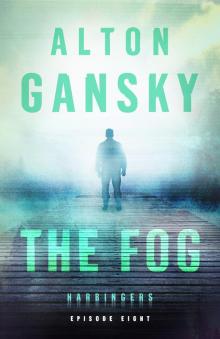 The Fog
The Fog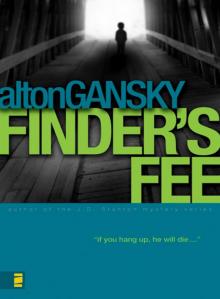 Finder's Fee
Finder's Fee Wounds
Wounds End Game (Harbingers Book 20)
End Game (Harbingers Book 20)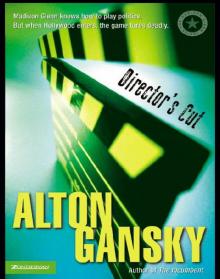 Director's Cut
Director's Cut Zero-G
Zero-G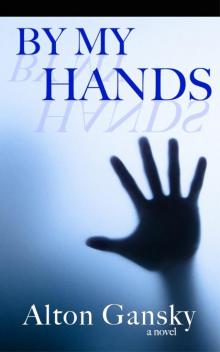 By My Hands
By My Hands The Village (Harbingers Book 12)
The Village (Harbingers Book 12) Beneath the Ice
Beneath the Ice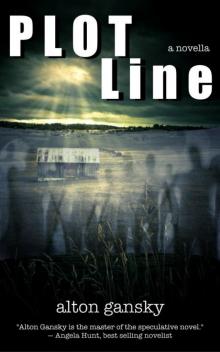 Plot Line
Plot Line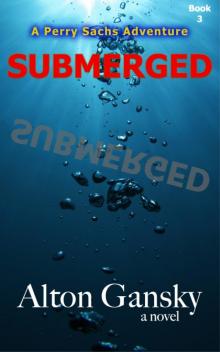 Submerged
Submerged A Treasure Deep
A Treasure Deep